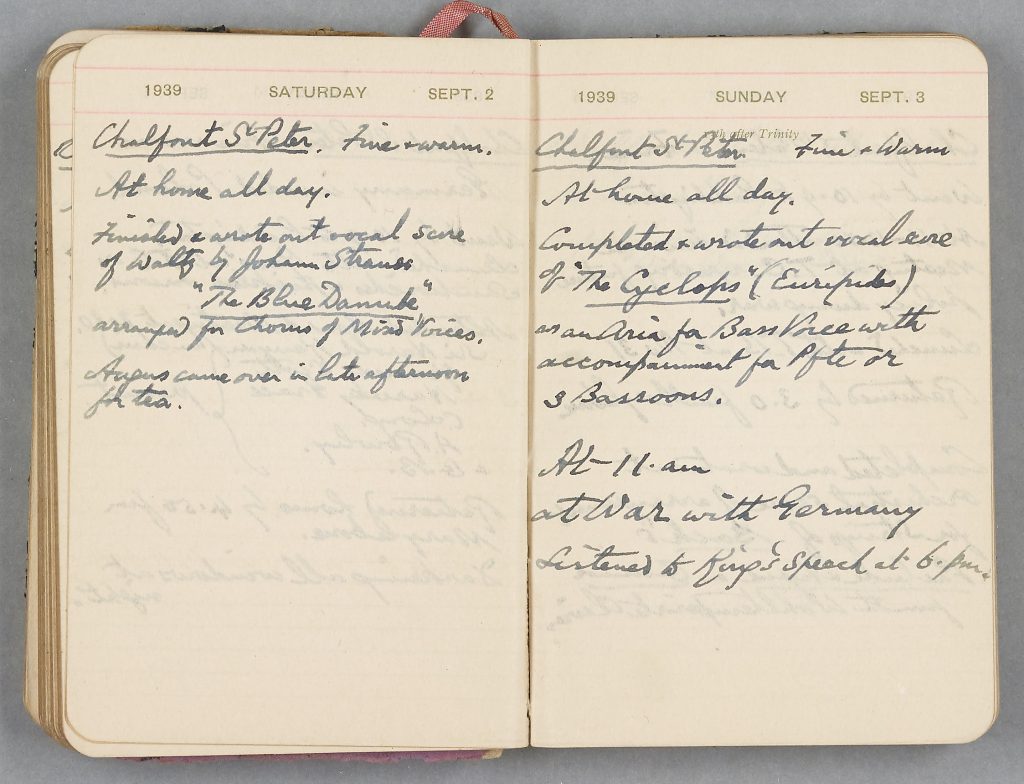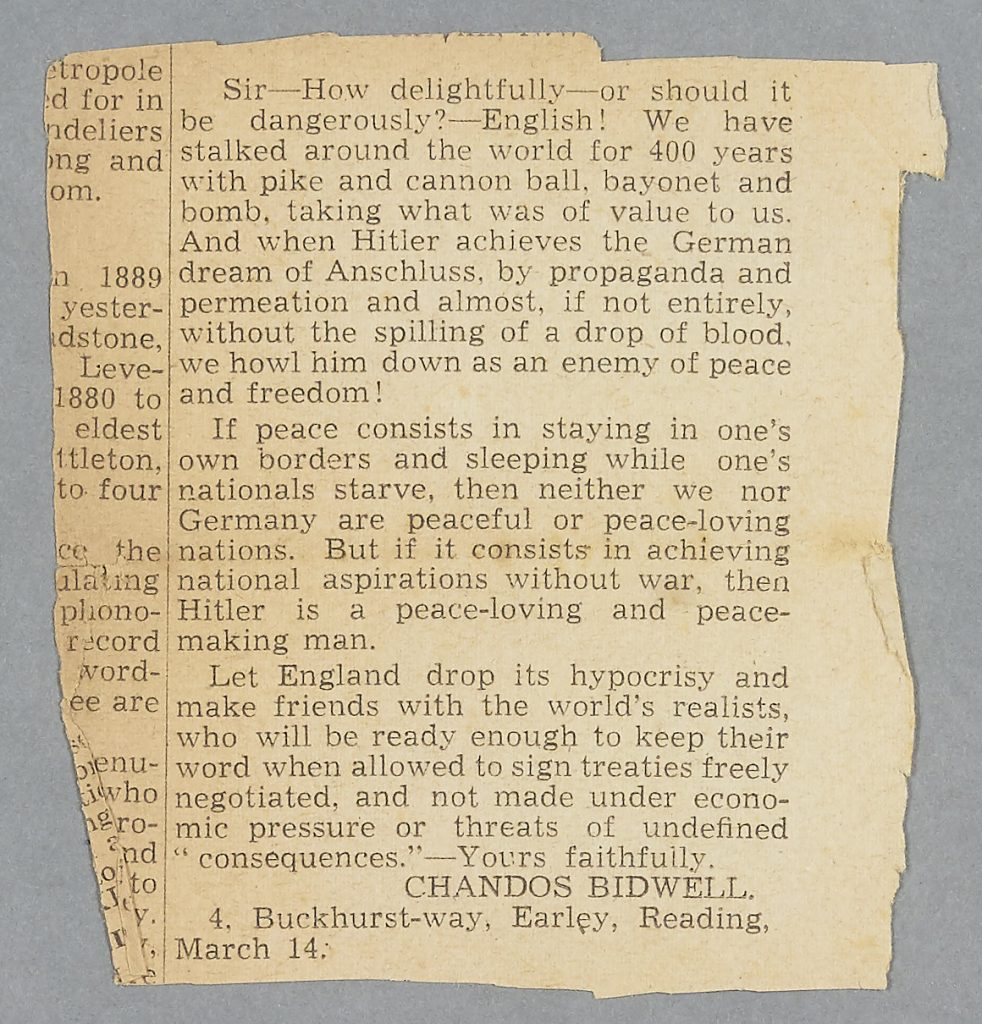The Granville Bantock Diaries: 1928 – 1946
- 26th April 2023
A recently catalogued collection of 37 handwritten diaries belonging to the composer Sir Granville Ransome Bantock shed insight into his life and music. Those written between 1928 and 1946 are the focus of this blog. Past posts cover the years 1911 – 1919 and 1920 – 1927.
In the later part of his life, composer Granville Bantock wrote, published and performed some of his most recognised works, from his Pagan and Celtic symphonies to song cycles inspired by his interest in, and work on behalf of, Anglo-Soviet relations. As the years progressed, his time was increasingly spent travelling and officiating as a teacher, examiner and ambassador for Trinity College of Music (London) – following his appointment as Chairman of the Cooperation in 1934. A man given to frequent changes of residence, Bantock moved to London mere weeks before the Blitz in 1940 – living his final years amidst The Second World War. He eventually settled in Barnt Green, Worcestershire in 1944.

Bantock notes the start of The Second World War in 1939, Granville Bantock, 1939: 705:462 BA16022/28
Of the eighteen years from 1928 to 1946, diaries exist for sixteen – those for 1933 and 1934 are sadly missing. In addition to his diaries, we know that Bantock also kept Advance Date Books – planners he used to record his intended activities. Two of these remain spanning the years 1937 to 1941, and two small pocket diaries have been used in a similar vein as jotters or date books. From 1935, a greater formality appears in Bantock’s entries – starting each with an underlined statement of where he is, followed by a comment on the day’s weather. It is possible that Bantock was himself a family history enthusiast where several entries also record trips to the house in which he was born, and those in which he subsequently lived.
Though less prolific as the years progressed, Bantock’s diaries continue to highlight an impressive compositional output, as well as associations with the BBC and Paxton Record Company. He never stopped writing and even recorded some of his earlier works, published in his final years. In June 1928, Bantock notes commencing his Pilgrim’s Process – a choral work commissioned by the BBC that is later mentioned in reference to a proposal to turn it into a ‘talkie’. On the same day he records the publication of Pagan Symphony, he accompanied his friend Frank Mullings ‘in a broadcast to Malaya & the Far East’ of a program of his (Bantock’s) songs.
During these years, Bantock continues to spend time with Joseph Holbrook, Sir Barry Jackson, Donald Tovey, Hamilton Hartey and Sir Edward Elgar. In 1930 – the same year he received a Knighthood – he records a trip with children Myrrha and Raymond to Worcester to have tea with Elgar at his home. Friends like Holbrook and fellow composer Havergal Brian almost certainly benefited from Bantock’s public support as a champion of British music. The songwriter Sir Harold Boulton, politician Sir Harold Kenyon, conductor Thomas Beecham and composer Edward d’Every are others in his long line of notable acquaintances. In 1928, Bantock meets and has tea with the writer H.G. Wells, and his traveling companions include future Prime Minister Neville Chamberlain, and the prominent Labour politician Herbert Morrison in 1938.
Bantock’s diaries of this period continue to highlight his commitment to Britain’s Labour Movement. For the 1929 General Election he mentions voting ‘for Socialist’. He often attended meetings of the National Council for British Soviet Unity, and entries even refer to his organising of an exhibition of Soviet Life in War and Peace. Despite his socialist convictions, however, it appears Bantock held a streak of conservatism where in 1945 he writes that he voted Conservative.
Following his retirement from Birmingham University and appointment at Trinity College, Bantock toured extensively at home and abroad including to the Americas, West Indies and Australia. On these trips he mentions meeting ‘several prominent musicians’ and citizens. In 1936, he attended a ‘reception given by Mrs Roosevelt at the White House’.

A newspaper cutting Bantock kept from 1938, Diary of Granville Bantock, 1920: 705:462 BA16022/27
On Sunday 3rd September 1939, Bantock notes the start of The Second World War, and from August 1940, he begins to regularly record air raids, bombings and the damage caused by the fighting – at one point spending the night in an Air Shelter with British soldier, diplomat and scholar Percy Sykes. Further entries detail where ‘bombs exploded within 50 yards’ of his London flat – resulting in several hours spent in the basement cellars, and where several windows of the house two doors down were smashed. Later, he writes that ‘an incendiary bomb exploded in the garden and on the roof of the flat, breaking several windows, and shaking the building’. When D-Day arrives in June 1944, Bantock writes and underlines the word ‘invasion’ at the top of his Tuesday 6th entry. He also notes ‘Victory Day’ just under a year later.
From September 1946 Bantock’s diary entries are less frequent and primarily record his declining health, doctor’s visits and time spent with his family. Though evidently dictated by him, some are written in his sons’ Raymond or Angus’ hand. On Wednesday 16th October, Raymond records his father’s death: ‘Sir Granville Banrock, my father, died at 6am, peacefully in my presence.’
His diaries tell the story of a lifetime spent in devotion to music.
The Granville Bantock Diaries are available to research. Please submit an enquiry at ArchiveEnquiry (worcestershire.gov.uk) or speak to someone on the desk if you would like to enquire about viewing these records. Transcriptions of many but not all are accessible on CD in our Self-Service Area.
Post a Comment